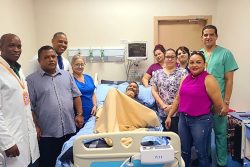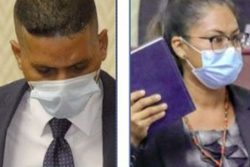Confirming much of what was already known, a report on Monday last brought into sharp focus the hypocrisy of British Prime Minister Boris Johnson, who not only allowed, but attended parties at 10 Downing Street during the period when COVID-19 lockdown rules were in effect in the UK. According to parliament.uk, those lockdown rules included a ban on social gatherings indoors enforceable by the police who were authorised to issue fixed penalty notices (FPN) to people found breaking the rules, or arrest them if necessary. Between March 2020 and June 2021, 117,213 FPNs were issued by the police in England and Wales. They missed the Prime Minister’s Office.
However, as it is perhaps best said utilising the Guyanese adage “wha miss yuh doan pass yuh”, the report by senior civil servant Sue Gray, who led an investigation into gatherings during the lockdown involving government officials, found inappropriate congregating that was “difficult to justify” as well as the “excessive consumption of alcohol” during said rendezvous. In short, partying. The investigation was ordered by the Prime Minister, though not through any sense of altruism, but clearly because of burgeoning reports in the media that these events had occurred, including the now infamous ‘bring your own booze’ party on May 20, 2020 in the garden at Downing Street, over which Mr Johnson’s resignation has been sought.
As it turned out, that was not the only event, nor were there just a few others, Ms Gray examined some 16 and on at least three occasions there were more than one a day. Seventy people were interviewed and information also garnered from emails, WhatsApp messages, text messages, and photographs. The UK’s Metropolitan Police are currently investigating several of these gatherings, now dubbed ‘partygate’ by some members of the international press. Mr Johnson, who has previously been heavily criticised for his entire handling of the COVID-19 crisis in the UK, apologised in parliament on Monday and vowed to “fix it”, though one wonders how he even imagines that to be possible.
Meanwhile, also on Monday, Hong Kong’s Secretary for Home Affairs Caspar Tsui resigned after having attended a birthday party for another government official some weeks ago although that region’s Chief Executive Carrie Lam had issued an appeal for people to avoid large gatherings. All 170 guests, of whom at least 19 were government officials, and the birthday boy, were later quarantined. Reports are that two tested COVID-19 positive.
Expressing deep disappointment, Ms Lam ordered an investigation into whether the attendance of the officials constituted a breach of discipline. Subsequently, according to Reuters, Mr Tsui issued a statement in which he said that as one of the lead officials in the COVID fight, he had not set the best example by attending the banquet held at a Spanish tapas restaurant. He offered his resignation and Ms Lam accepted it.
These are blatant examples of government/officialdom saying ‘do as I say and not as I do’. But as reprehensible as the behaviours described above are, the common and underlying thread is that in both instances consequences followed the actions. There has been public censure and things may even go further in the case of PM Johnson as that enquiry has not fully concluded.
One does not have to look too hard to recognise the same conduct in Guyana. On the one hand, there is the Ministry of Health imploring citizens to wear their masks, and keep a physical distance in the face of ongoing coronavirus infections and deaths. On the other, there are our leaders posing in photographs without masks standing perilously close to each other or to ordinary citizens.
There is no denying the fact that some of this is necessary – that the work of the government has to be carried out whether or not there is a global pandemic. One even understands the photo ops as people sometimes need to also see their government at work. However, the rest of it is mostly posturing and as Ms Gray said in her report, “difficult to justify”.
Granted, Guyana is not in lockdown, but given the daily deaths and infections, why do our leaders seem so determined to set the worst examples? Appearing maskless in photographs and videos at both convivial (the First Lady’s ball and the Private Sector breakfast were two such occasions) and political (the mace-grabbing fracas in Parliament is an example) events surely demonstrate to the masses that they can do the same. Or is the Ministry of Health’s warning only for ordinary folks?
The importance of human contact to our lives is well known and documented. People need tangible, social interaction; it lowers the stress hormone and releases the feel-good oxytocin, which in turn boosts both physical and mental health. The pandemic has taught us that much. However, it would all be to no avail if the closeness simply served up more coronavirus. Lest we forget, COVID-19 is airborne, hence the need for masks, distance and hygiene. Furthermore, the vaccinated can become infected and not everyone who is affected is symptomatic. Responsible behaviour and its opposite both have trickle-down effects. Our leaders would do well to remember this.




